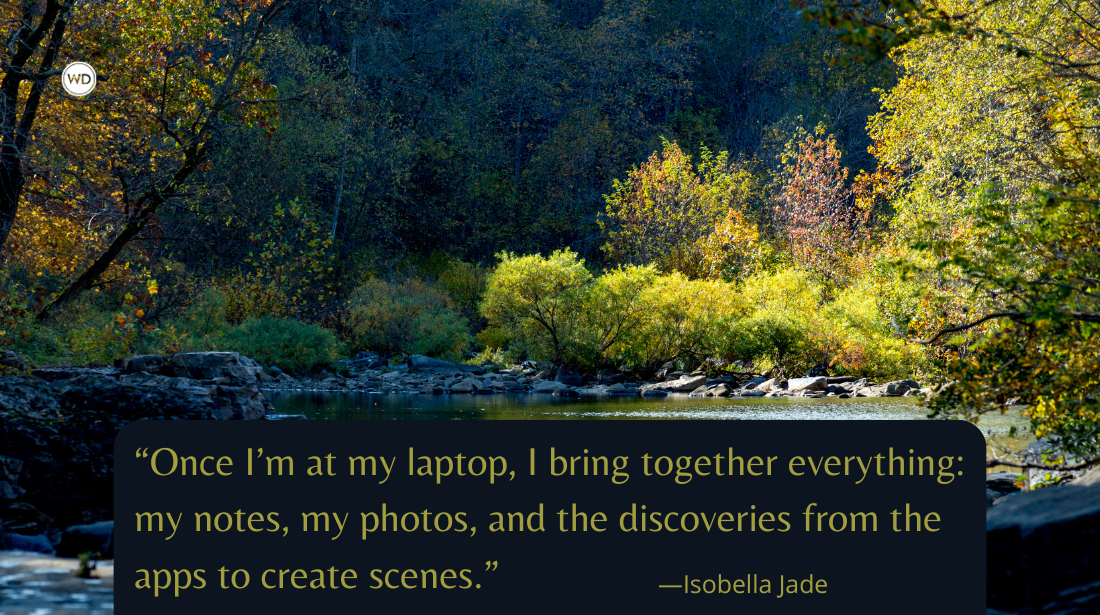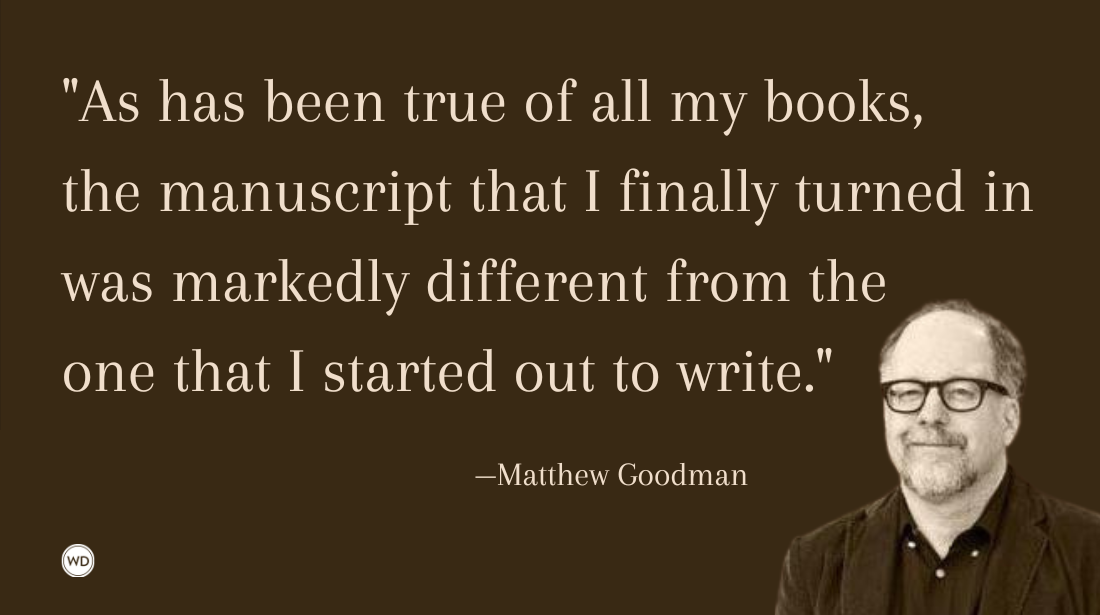Nuggets of Humor
Bestselling humor author Samantha Irby talks about her writing process and finding funny topics for essays.
Congratulations to Samantha Irby, whose bestselling 2020 book Wow, No Thank You is a finalist for the 2021 Audie Award in humor. In honor of this achievement, WD is sharing an interview with Irby, originally published in the July/August 2020 issue.
There’s no subject too taboo for humor author Samantha Irby. From her Bitches Gotta Eat blog where she started writing to her three essay collections, Irby has told real-life stories about everything from her tribulations with Crohn’s disease to easing into middle age. Readers praise her writing for its relatability and constant LOL moments.
When Irby’s third book Wow, No Thank You released in March 2020 from Knopf, she had a phone conversation with WD about the new release.
As a writer, how do you overcome feelings of self-doubt?
My way of flipping that on its head is to remind myself that there are people who like [my writing] and that it is serving a specific purpose of making people who like it laugh. You know how some people are like, “I want to reach people who aren't my target audience?” I don’t, I want to keep preaching to the same choir and finding people who are like, “This diarrhea humor resonates with me.” My way of getting over doubt is to be like “You have a lane and you stay in it and you are good in that lane.” Don’t try to be smarter or do anything that doesn’t naturally come to you. I know my limits. I guess that is a good way of overcoming doubt. It’s to not tackle anything I can’t actually do.
I definitely laughed out loud [at Wow, No Thank You].
That makes me happy. My coping mechanism is to take anything that’s kind of sad and find nuggets of humor in it. So from here on out I’m only going to write about things that are funny. My first two books have a dead mom essay and a dead dad essay. Now that we’ve gone through that, it’s all jokes from here.
How do you find which topics are worthy of an essay?
Some things happen and in the moment I’m like, “This is humiliating! When the sting wears off, it’s going to be a good story.” Sometimes I go into things knowing if I’m invited to a ridiculous thing, there’s probably gonna be something funny in here. It’s usually big and embarrassing things. And I’m like, “I can work with this.” Sometimes I look at whatever situation I’m in, like writing about my house that I don’t know how to take care of, and I could go down a spiral. I could feel inadequate about not knowing how to wash windows or I could write about it and laugh at myself and help somebody else feel less like they’re the only person going through that thing. It’s squeezing whatever I can out of whatever lemon I’ve been given. Sometimes things happen and they’re funny, but there’s not 2,500 words to say about it and those are stories you just tell in bars. But if a thing happens and I feel like other people can relate to it and I can make fun of it, I can usually make a good essay out of it.
Are you able to start writing about something as soon as it happens?
I can usually write about things right away, especially if they have an ending. So my process—please cross out that I said process, because I’m not fancy enough to have a process—when I’m going to write something, I have to know how I’m going to end it. So I always know the ending and work my way backward. If it’s an ongoing thing that needs a conclusion and doesn’t have one, I don’t write it. I [don’t] write about [things] immediately because procrastination is the only way I get anything done. I’m usually not motivated by anything other than a fast-approaching deadline.
You write in your new book that you procrastinated writing Meaty the entire winter after signing the book contract, then rushed to write the manuscript and turned it in the day it was due. Has your writing process has changed since then?
I could lie and tell you I’m on time, but I have many emails from my editor as proof [otherwise]. I never turn work in so late it messes up production because I understand my tragic self cannot alter a publisher’s deadline. But the dates that my editor gives me, I run right up on them. I will turn things in at 11:59 and be like, “Technically it was in when you said it needed to be in.” She’s gotten a lot of things turned in at three in the morning because I stayed up all night to write something.
Well, your editors probably know to expect that from you.
This isn’t our first rodeo. I do my best stuff when it’s like a train is chasing me. When I can hear every second of the clock ticking louder. I feel like my editor would have an easier life if I were more organized and turned things in early. But that’s no fun.
How are you able to recall the details that make up your essays?
A lot of phone notes. If things happen with other people, a lot of, “What did that dude say?” I have receipts for meals if I need specific details. I believe we call this work creative nonfiction because I’m not going to remember every detail. Usually it’s not a detail that is important that I forget. But [my writing isn’t] reporting and everything is through my lens anyway.
When writing about things that are traumatic or that impact you in a negative way, those things stand out. I write a lot about the burning shame of being alive. Those things are tattooed in my memory. I can remember every mean thing someone said, what classroom we were in. That type of thing sticks with you.
I like your writing because your language is so colorful: “More than one person has caused me to do the ‘pack whatever you can carry because we are leaving tonight shuffle.’” ["$$$," Wow, No Thank You] If you just said you got evicted, that wouldn't have been as funny. How do you come up with these creative ways of saying things? Does it come to you naturally, or is it a process of revision?
It comes naturally. My favorite thing to read is overly descriptive stuff. I want to know every emotion a person felt and everything in the room. So it lends itself to my writing. When you’re trying to write a funny thing, it is funnier rather than saying evicted to give super specific details, because eviction can be all sorts of things. My experience with it has been, more than once, to pack and leave in the middle of the night. It gives you a better sense of the situation. Also, I have a word count and I want to—no, I’m kidding. I never have a word count that I worry about. But it is funnier to break things down to their essence.
It also makes your writing tight because there’s a joke in every sentence. Every joke carries the narrative along. Do you have any tips on how you achieve this balance?
I just put everything on the page. My style is stream-of-consciousness. I don’t know how to tell people how to do that other than to write every coherent word and then go back and fix it. I think about a thing and turn it over in my mind and write the whole thing out. Then I look at it and say, “these are the funny bits” or “I need to clean this up.”
Even with your late-night deadlines, you still find time to revise before you turn it in?
Yeah, I’m deeply embarrassed by my mistakes. Sometimes that’s what makes it late is going back and trying to fix it. It gets seen by multiple eyes and then sent back to me with, “You use this word six times” or “We don't understand this colloquialism.” I try to get it to the best my awake-for-too-long brain can get it to minimize the amount of embarrassment I feel when they send it back to me.
I like the creative forms you use to frame essays, like “My Bachelorette Application” in We Are Never Meeting in Real Life, and I wonder how you find these forms.
Sometimes the things I want to write about or jokes I want to make don’t lend themselves to an essay format. If I could write lists all the time, that would be great. Or if I could do Q&As where I riff on someone’s question, that would be the joy of my life. If a thing is the story, then I’ll write it like a story. But if I want to do a bunch of riffs, then I’ve got to figure out a way to structure that so I can get it in the book. It’s always like, “How can I get away with writing something in a list format without writing a bunch of lists?” Or “How can I crack joke after joke without trying to figure out how to weave a story in between?” So those are just like, “How can I format it so that my editor will accept it?”
Do you have advice for writers who feel like they don’t have anything to write about?
Well, that is often how I feel. With humor writing, the trick is to find that nugget of funny and build out. Look for the silver lining of absurdity you can build a story on. Because what I do is observational, there always is something around you to write about. We do a disservice to ourselves when we think all writing has to be deep and meaningful. I don’t have the pressure of feeling like I have to write about some important thing. I write about nonsense things, and everyone has nonsense things they can write about. Your writing doesn’t have to move mountains. I write to make myself laugh. If other people laugh, that’s a bonus. Write about whatever nonsense thing and in the course of doing that, maybe something will come to the surface that feels like a thing you actually want to write about.
That’s a good way of looking at it because you don’t get anything unless you're sitting at your computer thinking.
The pressure to have your writing be good and meaningful could be paralyzing. If you think about all the things your writing should be and what you should be writing about, you’re never going to write anything. I wouldn’t have a career if I was waiting for something I felt smart enough to write about. I started writing about going on bad dates and shitting in a diaper. Take pressure off yourself, write about things that don’t feel important, and make yourself happy.
About Cassandra Lipp
Cassandra Lipp is managing editor of Writer's Digest. She is the author of Queen City Records, which tells the stories behind the indie record shops of Cincinnati and Northern Kentucky. Her work has appeared in Greener Pastures, The Belladonna, Little Old Lady, Points in Case, and Ohio's Best Emerging Poets 2019. Follow her on Twitter @Cassie000000.








